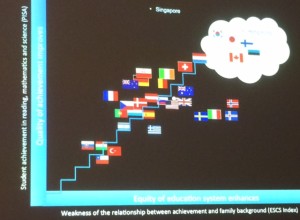When it comes to education there is Finland and there is everybody else. Finnish students are ranked as the highest performers in the world and their success has captured the attention of educators around the globe. Accordingly, this year’s SXSWEdu conference featured a panel with two Finns sharing big ideas for improving education on a massive scale.
The Finns in question are Pasi Sahlberg, a visiting professor at Harvard University’s Graduate School of Education, and Saku Tuominen, a co-founder and the creative director of an education innovation organization known as SCOOL.
are Pasi Sahlberg, a visiting professor at Harvard University’s Graduate School of Education, and Saku Tuominen, a co-founder and the creative director of an education innovation organization known as SCOOL.
Sahlberg spoke first and his discussion explained exactly what it is that makes Finnish education so impressive. He laid out two important rubrics for how a nation’s educational quality should be assessed: quality and equity. He featured the graph to the right as a visual representation of where various nations fall on each of these scales (the vertical and horizontals bars represent quality and equity respectively). Finnish education, as you can see, scores incredibly high on each measure.
The panel’s audience was well aware of the accomplishments of the Finnish education system. At the beginning of Sahlberg’s discussion he asked attendees, the majority of them educators, to raise their hands if they would be interested in moving to Finland. The response was overwhelming: nearly every hand was proudly in the air.
After Sahlberg detailed exactly how high the bar set by Finnish education is, Tuominen took the stage to discuss a plan to make it even better.
He spen t the bulk of his time discussing HundrED, a project with which he is heavily involved. HundrED was borne in the wake of Finland’s 100th anniversary and its goal is to find out what important, knowledgeable figures in education around the world think should happen over the next 100 years when it comes to education. The results of HundrED’s investigation will be compiled into both a book and a documentary. This material, and other ideas generated by the project, will be made available free of charge around the globe in an effort to raise the quality of education in Finland and beyond.
t the bulk of his time discussing HundrED, a project with which he is heavily involved. HundrED was borne in the wake of Finland’s 100th anniversary and its goal is to find out what important, knowledgeable figures in education around the world think should happen over the next 100 years when it comes to education. The results of HundrED’s investigation will be compiled into both a book and a documentary. This material, and other ideas generated by the project, will be made available free of charge around the globe in an effort to raise the quality of education in Finland and beyond.
An important aspect of this project is its emphasis on avoiding complacency. The Finnish education system is clearly working, but Tuominen’s position is that people should avoid waiting until something doesn’t work to fix it. In his words: “If it works, fix it.”
Tuominen reviewed three major principles that have emerged from the work HundrED has done thus far:
- Give children time to play.
- Prepare students to be wrong.
- Build on what has previously worked.
The existence of guiding principles, however, should not be taken as an endorsement of the idea that standardization is king. While many people take this notion as a given when it comes to education, Tuominen made it clear that he does not believe that to be true.
“The more I think about this (notion), the more I disagree,” he said.
